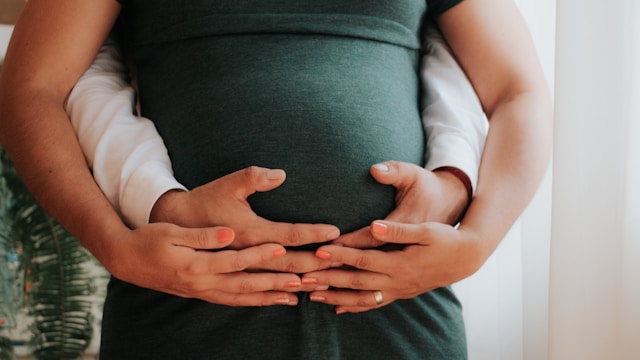Pregnancy and Postpartum
Has Conceiving A Child, Pregnancy, Or New Parenthood Taken An Emotional Toll On You?
Are you struggling with issues related to childbearing? As a woman who may currently be trying to conceive, already pregnant, experienced perinatal loss, or recently given birth, are you overwhelmed, anxious, depressed, and exhausted? Have interactions with your care providers left you feeling overlooked, ignored, and devalued?
Perhaps you weren’t prepared for how time-consuming and emotionally strenuous this chapter of your life would be. You might be juggling ongoing appointments and check-ups with a full-time job and other social obligations. If fertility treatments, pregnancy, or postpartum complications are affecting you physically, you may feel depleted, which could negatively impact your mental health. And if you have had one or more miscarriages, the grief you’re experiencing may seem unbearable and make you question if you want to try again.
 You May Feel Unsupported
You May Feel Unsupported
When your caregivers—and possibly your partner—are not meeting your emotional needs, a time that you imagined would be joyful and exciting may instead feel stressful and overwhelming. Thoughts related to fertility, pregnancy, or parenthood might preoccupy your mind, affecting your sleep and mood. The uncertainty and lack of control you experience could be leading to anxiety, depression, and mental exhaustion. What’s more, a lack of attentive, compassionate care from your medical team may cause you to feel unheard and unseen.
At times, you might feel like something is wrong with you because you expected to feel differently than you do. By focusing on perinatal mental health, CBT Colorado offers counseling for women like you who are struggling with fertility, pregnancy, or the first year or two postpartum. By practicing mindfulness, cultivating self-compassion, and identifying negative thought patterns that don’t serve you, therapy for women can help shift your outlook more positively.
Conceiving And Birth Giving Is A Vulnerable Time For Women
The perinatal period—which spans the timeframe before, during, and after birth—is a time when women are often at their most vulnerable. With our hopes and dreams inextricably tied to getting pregnant and giving birth to a healthy baby, the stakes couldn’t be higher. If getting pregnant is challenging, this phase can extend well beyond its normal parameters and, in turn, become even more emotionally fraught.
Although we’ve been told this should be a happy time, women often feel anxious, afraid, and isolated. We may feel ashamed if we struggle with infertility, can’t relax and enjoy pregnancy, or don’t find every minute of caring for our newborn joyous. Even though our social media scrolls are clogged with idyllic images of blissed-out mommies and their cherubic babies, we often wonder why we feel so stressed out and overwhelmed by the process.
The Current State Of Maternal Health Is Lacking
Sadly, when it comes to maternal health, the American healthcare system often fails women. Most infertility clinics are for-profit and, therefore, incentivized to push IVF due to it being the most highly compensated "treatment." Women feel pressured to do whatever it takes to get pregnant and not ask questions. Once pregnant, women often feel like the baby becomes the sole priority in the eyes of their providers.

Although small pockets exist that value a woman’s consent and autonomy, the greater medical system is based on a hierarchical model. Oftentimes, OBGYNs expect their “patients” to comply with their recommendations, even when they are unnecessary or run counter to their birth plan. Women who dare ask questions or refuse to comply are met with irritation and fear-based threats designed to get them to submit. After delivery, they're forgotten until they have one follow-up appointment a full six weeks after giving birth.
Attending to your mental health during the perinatal period is important. Therapy for women provides compassionate and validating support that may be absent elsewhere in your life.
Therapy For Women Offers Customized Treatment Focused On Perinatal Mental Health
If your mental health during the perinatal and postpartum phase has been marred by depression, anxiety, or trauma, women’s counseling services offer a safe space to set down the expectations of motherhood and express how you’re truly feeling. In therapy for women, you will be given space to process the complexity of your experience with a female therapist who can empathize with you and validate your challenges.
The thoughts and feelings you have surrounding infertility, pregnancy, giving birth, and new parenthood are normal. Talking to a nonjudgmental therapist allows you to admit that you’re struggling and that, as much as you want a child, nothing about the process is easy. Being open and honest with someone about how you’re feeling can be your lifeline to restoring balance and fostering self-compassion.
 What To Expect In Sessions
What To Expect In Sessions
In sessions, we will explore the uncertainty you are experiencing and teach you helpful skills to help you build your tolerance for living with the unknowns. We will also address any perfectionism you may have related to motherhood to ensure your expectations are reasonable. If you’ve had a history of depression, anxiety, or trauma before the perinatal or postpartum period, we will talk about your mental health openly and track how you are feeling throughout therapy.
The Modalities We Use In Perinatal Therapy
We incorporate evidence-based modalities into perinatal mental health counseling for women, including Cognitive Behavioral Therapy (CBT), Acceptance and Commitment Therapy (ACT), mindfulness, and self-compassion therapy. With CBT, we examine how your thoughts, emotions, and behaviors are interconnected and identify the negative self-talk that exacerbates anxiety and depression. When you start to observe how thoughts and beliefs contribute to your distress, especially when you’re sleep-deprived, you can shift away from negativity and reframe your experience.
ACT allows you to depersonalize your thoughts so that they are no longer internalized and associated with your identity. For example, with Acceptance and Commitment Therapy, you may say, “I am a person experiencing postpartum depression” instead of “I am depressed.” Further, in ACT, you will identify core values to ensure that the things you choose to do are consistent with those values.
Practicing mindfulness helps you stay in the present moment and build resilience to get through the more challenging times by appreciating the good moments, such as your baby’s milestones. And self-compassion can be cultivated by realizing that struggling with perinatal mental health is a universal experience all women share. The good news is that it’s temporary.
Suffering through the perinatal phase alone when it feels like no one else understands your experience is excruciating. Pairing up with a therapist who gets it will calm your nervous system and put you at ease.
But You May Wonder Whether Perinatal Mental Health Therapy Is Right For You…
I don’t have time to attend women’s therapy.
With so many unknowns to contend with, making time for perinatal therapy that addresses mental health issues such as postpartum anxiety and depression is one thing within your control that you can do for yourself. Our therapists for women offer outside resources, such as books and podcasts, that you can utilize in between sessions. What’s more, we offer online and in-person appointments six days per week so you can make time for therapy even when you're busy.
If I seek counseling for women, will my therapist be female?
At Colorado CBT, we strive to match our clients to therapists they feel comfortable with. Because perinatal mental health is a uniquely female experience, we will pair you with a female therapist. Attending therapy for women with a skilled postpartum counselor with advanced training and understanding your specific concerns greatly increases your chances of a favorable outcome.
Given all the other expenses I have, I don’t think I can afford therapy for women.
Perhaps you’re reluctant to seek counseling for postpartum depression or anxiety because you already have medical bills associated with infertility, pregnancy, and/or childbirth. However, making effective perinatal mental health care accessible to women is a priority for us. That’s why we offer reduced-fee sessions and are also in-network with some major insurance providers. Click here for more information.
Your Mental Health In The Perinatal Phase Is A High Priority
|
Allow our therapists to support you at this vulnerable time. To find out more about therapy for women with Colorado CBT, please visit our contact page to schedule a free 15-minute consultation. |
Latest posts

The Impact of Infertility on Mental Health

Signs of Postpartum Anxiety

